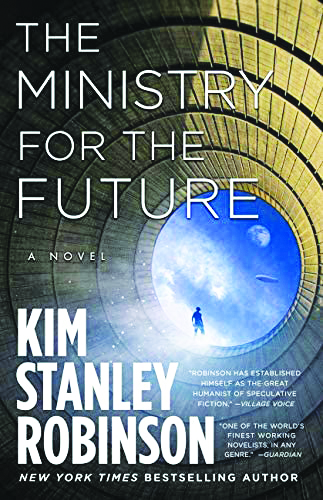
The climate on our planet is changing; and reversing the inevitable seems as if it will require a bit more cooperation than humanity has yet been unable to muster. The alarm bell has been ringing for so long that the clanging has become just so much more white noise. Sirens wail, horns honk, jackhammers patter upon broken pavement, and now scientists cackle away about trivial matters like the catastrophic breakdown of civilization. Ho-hum.
Indifference to impending disaster is certainly troubling but this hasn’t discouraged American science fiction writer Kim Stanley Robinson. In The Ministry for the Future (2020), he rings that climate bell just a little bit louder in a harrowing and yet potentially hopeful account of our very near climate future.*
While offering a vast array of technological and social solutions to address climate change and the disruptions which await us, Robinson initially zeroes in on a singular characteristic of the problem: too much carbon in the atmosphere.
Robinson’s premise is that the current economic system continues to reward economic behavior that pollutes. Today, wealth is measured in dollars for nothing more than the sake of measuring wealth. What if we shifted to a form of currency that measured wealth for earth’s sake? What if wealth accumulation was tied directly to planetary health; that bountiful economic activity was measured in terms of the good accomplished for society? What if wealth was tied directly to carbon removal?
Robinson’s answer to these transformative questions is the introduction of a new form of global currency, the carbon coin, one that values the earth, not just the material comforts it might purchase for its accumulators.
Robinson offers how carbon coins can become the currency of the global realm without disrupting and antagonizing entrenched capitalist structures.
The world’s wealth and monetary policies are overseen by a handful of central banks including the Federal Reserve Bank of the United States, the European Central Bank, and similar institutions for Japan, India, the UK, Canada, Australia, New Zealand, Switzerland, and scores of other smaller nations and institutions.
For the most part, these institutions are relatively free from political influence. So, if only a small number of the largest central banks could be convinced of the practicality of the carbon coin – and this is perhaps less than one hundred really smart actual people – the other banks around the world would be motivated to follow their lead.
What is needed is a catalyst for action.
The opening line of Ministry gets right to this point: “It was getting hotter.” What quickly follows is a terrifying account of a “wet bulb” event that claims twenty million lives over a single weekend. Wet bulb events occur when extremely high temperatures are paired with humidity so severe that perspiration is unable to evaporate which, by the way, is how the human body cools itself. The event portrayed in Robinson’s near-future is fiction but is built upon fatal wet bulb events which have already occurred.
In response to 20 million fatalities, the nearly two hundred signatories to the Paris Agreement on climate change gather to address the same problem they had been discussing since 2015. A full generation later in Robinson’s story, the Paris Agreement leads to the formation of The Ministry for the Future, a small committee whose stated purpose is to establish and protect the rights of those-yet-born as equal to those now living. Note that the ministry is not OF the future, but FOR the future.
While promoting a wide range of planetary health initiatives, the critical incentive to action is the deployment of the carbon coin.
Convincing that handful of central bankers to give the new currency a try is the work of our protagonist Mary Murphy, the head of Robinson’s Ministry for the Future.
While Murphy repeatedly attends central banker meetings to sell the need for the carbon coin, other story lines in Ministry illuminate both the tragedies that await us if we do nothing and the varied possibilities of how we might overcome them.
Robinson’s assumption is that a climate event which takes twenty million lives in short order would actually get the world’s attention. And here is Robinson’s faith in humanity on full display as he imagines the human race as a community that looks out for one another. In this, he does not shy away from promoting socialism; not the version castigated by those who have most benefited from capitalism but that form of socialism in which we all benefit when all of us have our basic needs met.
Hence, the “fiction” Robinson portrays is not-so-much imagining some new-fangled technology to get ourselves out of the current mess but rather, the means by which we might collectively harness enough willpower to implement many technologies that already exist. Robinson’s primary fiction, then, is imagining a strength in humanity that does not yet exist while his hope in us represents nothing less than the moral uplift of the species. What better way to do that than associate healthy planetary behavior with money?
In sweeping commentary of the modern world, Robinson’s science fiction is replete with organizations, technologies, and ideas that could prevent the inevitable disaster on the horizon. The only thing lacking is the collective will to act.
In Robinson’s future, energy companies and petro-states would be rewarded for NOT extracting more fossil fuels. And, their drilling and pumping technology, along with their workforce, would be used to pump seawater toward the South Pole in a direct attack on sea level rise. Desalination plants would produce fresh water to relieve drought. Glaciers now sliding into the sea would be slowed by pumping out the melt-water which now lubricates their path to the oceans. And, of course, all this activity would be rewarded with carbon coins.
A “half-earth plan” would establish wildlife corridors and entire zones of the planet would be set aside for biosphere renewal. This is not some touchy-feely concern for animals but, rather, the acknowledgement that the earth’s flora and fauna diversity improves the health of the planet and of humanity.**
Robinson also proposes a universal passport for climate refugees. Everyone would be guaranteed a job. Worker cooperatives would replace corporations. The highest compensation for CEOs and the like would be capped as a ratio with the lowest paid employee.
“To be clear,” Robinson pleads, “there is enough for all. So there should be no more people living in poverty. And there should be no more billionaires. Enough should be a human right, a floor below which no one can fall; also a ceiling above which no one can rise. Enough is as good as a feast—or better.”
He even suggests new religions that address our globally shared reality and identity; an entirely new template upon which to imagine ourselves in relation to the billions of others with whom we share a home.
Robinson is not naïve and he openly accepts that there will be many obstacles to change. The whole business of the Ministry for the Future, he hints, may require a “dark wing.”
A mysterious character speaking with Mary Murphy says, “Some of these people are committing crimes that will end up killing millions! They spend their entire lives working hard to perpetuate a system that will end in mass death.” The real work of saving the planet he adds is much “[l]ike identifying the worst criminals in the extinction event and going after them.”
“If you were serious,” he tells Mary, “you’d have a black wing, doing things outside the law to accelerate things.”
In one dramatically rendered example, those who spend a great deal of time flying around in carbon-producing jets would need to be discouraged from doing so. The need to travel rapidly would have to be appeased.
Because, whether we destroy our biosphere or decide to save it, one thing is certain; the world is going to slow down.
For those of us who live in comfort, as all of us reading this most certainly do, global catastrophe can be difficult to fathom. Perhaps what is necessary is for more of us to understand that, no matter the assumptions one makes about the sustainability of that comfort, sometimes “[t]hings just fall apart,” Robinson writes, “and the next thing you know you’re eating your cat.”
Now that’s a fine ring of the bell, there.
*Podcast Interview with Kim Stanley Robinson here:
https://your-undivided-attention.simplecast.com/episodes/how-science-fiction-can-shape-our-reality-V4lSpHr6
**See the half-earth project here: https://www.half-earthproject.org





Source??